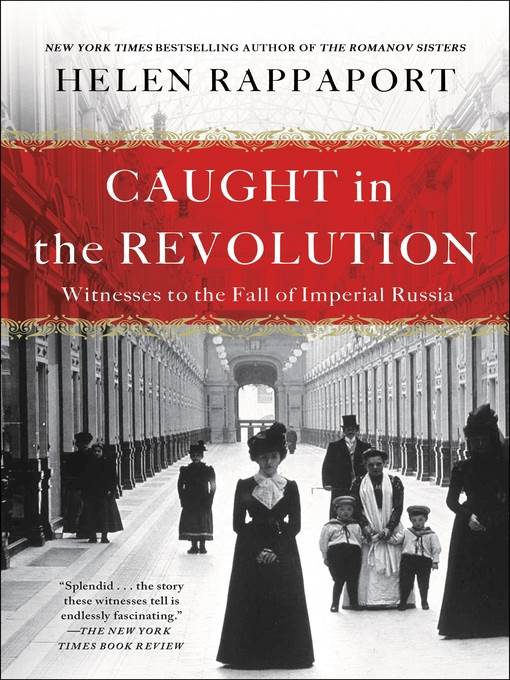
Caught in the Revolution: Petrograd, Russia, 1917
A World on the Edge
کتاب های مرتبط
- اطلاعات
- نقد و بررسی
- دیدگاه کاربران
نقد و بررسی

December 19, 2016
Rappaport (The Romanov Sisters) adopts an eyewitness approach to the Russian Revolution of 1917 in this fun, fast-paced, yet frivolous work. She bases her story on the firsthand accounts of Westerners in Petrograd at the time—a mixed bag of bankers, diplomats, journalists, socialists, and socialites, including Julia Dent Grant (granddaughter of Ulysses S. Grant); journalists Florence Harper, Arthur Ransome, and John Reed; and American war photographer Donald Thompson. Some witnesses braved the mob scene with camera and notebook in hand. Others barricaded themselves in their offices and watched through their windows, fearing for their lives as the violence escalated. Rappaport fails to really develop these personalities, and the perspective changes as rapidly as the street names. Compared to Reed’s Ten Days that Shook the World or Richard Pipes’s classic The Russian Revolution 1899–1919, this is revolution-lite, very colorful but without much analysis or context. Rappaport treats readers to glimpses of the general strikes, bread protests, looting, and red banner–waving through the smoky-rose glasses of these wistful and unprepared foreigners. Sadly, the Russians are reduced to a ragged, hungry monochrome mass. Map & illus. Agent: Caroline Michel, Peters Fraser & Dunlop.

December 1, 2016
Rappaport (The Romanov Sisters, 2014, etc.) gathers together the impressions of foreign witnesses to the historic events of the Russian Revolution.In the heady, uncertain weeks of the revolution, mobs in Petrograd (now St. Petersburg) looted and burned any and all artifacts of the Romanov family, only recently deposed. They tore down street signs and museum placards that bore the imperial insignia, and there was frequent shooting in the streets. An American journalist, seeking shelter in a gutter, found himself lying alongside a Russian officer. "I asked what was happening," he wrote later. The officer replied: "The Russians, my countrymen, are idiots. This is a white night of madness." Rappaport records these and other recollections, creating a portrait of the Russian Revolution from the points of view of outsiders who happened to be in Petrograd at the time. Foreign diplomats, journalists, and businessmen recorded their thoughts in letters, journals, and newspaper accounts both in the midst of the action and in the years following. The author uses these accounts, many of them unpublished, to follow the action from the czar's abdication in February 1917 to the ascendancy of the Bolsheviks in October. Rappaport assumes prior knowledge of these complicated events, so leading figures and key moments receive only brief introductions, and she features so many different speakers it can be hard to distinguish among them. Still, their accounts are useful because of the remarkable events they record. Sometimes those events are intriguing for their very prosody. The morning after Lenin and his fellow Bolsheviks took control of the Winter Palace, a Dutch diplomat, walking around the city with his wife, found that, while they'd been asleep, "the second Revolution had been accomplished." As he wrote later, "we did not realize what a great historical day we were living in as we trod our way home through the perfectly tranquil streets filled with apathetic, indifferent looking people." An occasionally scattershot but undeniably valuable history of the Russian Revolution.
COPYRIGHT(2016) Kirkus Reviews, ALL RIGHTS RESERVED.

Starred review from November 15, 2016
Rappaport expands her Russianist oeuvre beyond her four previous works, including The Romanov Sisters, with an inclusive narrative of the 1917 Russian Revolution through the eyes of diplomatic and journalistic European witnesses. A series of devastating revolts in that year saw bolshevism rise out of the ashes of the Romanov monarchy. At the time, Petrograd (now Saint Petersburg) was a cosmopolitan community of expats, journalists, and diplomats. These American, French, and British residents quickly went from a "demi-monde" life of privilege to threats of mortal danger and suffering privations along with the Russian people during the incendiary events of the uprising. Rappaport scoured firsthand accounts to tell the story through these memoirist outsiders who witnessed the birth of a new nation and political ideology, "Bolsheviki." Although citing standard resources such as John Reeds's Ten Days That Shook the World, the research represents the most comprehensive compendium to date of non-Russian perspectives across social classes. Includes a glossary of eyewitnesses along with an extensive bibliography and index. VERDICT An engaging if challenging look at a country's collapse with worldwide repercussions. Informed general readers will enjoy this glimpse into history; scholars will declare it a definitive study.--Jessica Bushore, Xenia, OH
Copyright 2016 Library Journal, LLC Used with permission.

January 1, 2017
Best-selling author Rappaport, whose books on Russia include The Romanov Sisters (2014), here tackles two standout revolutions in an explosive year and tumultuous location: the February and October 1917 revolutions in Petrograd, Russia. Not only that, but she also approaches these momentous events from eyewitness views not usually reported in the years since: those of foreignersEuropeans, Americans, and others; diplomats, valets, engineers, reporters; men and womenthere for a variety of reasons and befuddled or even forewarned by what was coming, yet choosing to remain, or leaving regretfully. Rappaport's elegantly detailed writing shapes and pulls together excerpts from letters, diaries, articles, and more, quoted throughout, creating the immediacy and energy of history in the making: terrifying, brutal, and unforgettable. Though Rappaport notes that her dissemination of the reports of non-Russians in the Russian Revolution seemed best held until 2017, the centenary of the revolution, little would she know how timely some of the quotes might be. To wit, newspaperman Harold Williams on the new Russians: It is nothing to them if in the throes of the great upheaval the world relapses into barbarism. (Reprinted with permission of Booklist, copyright 2017, American Library Association.)

























دیدگاه کاربران